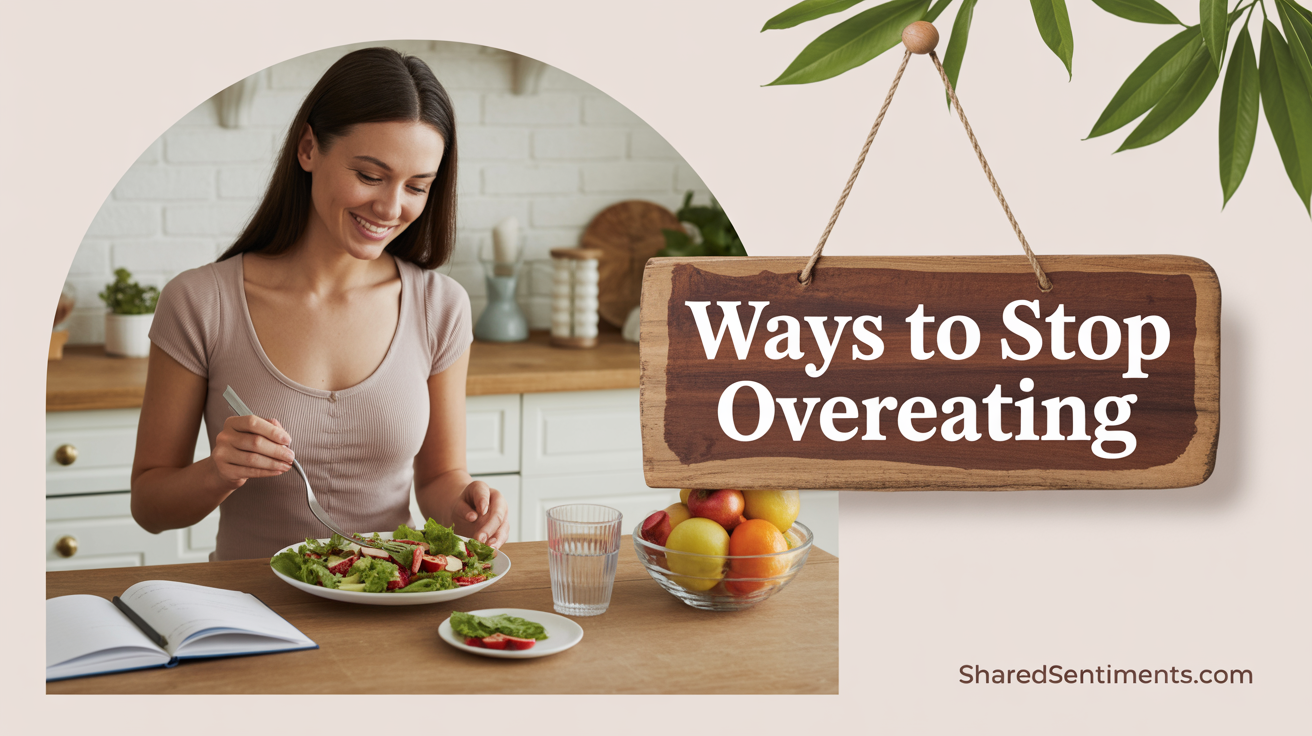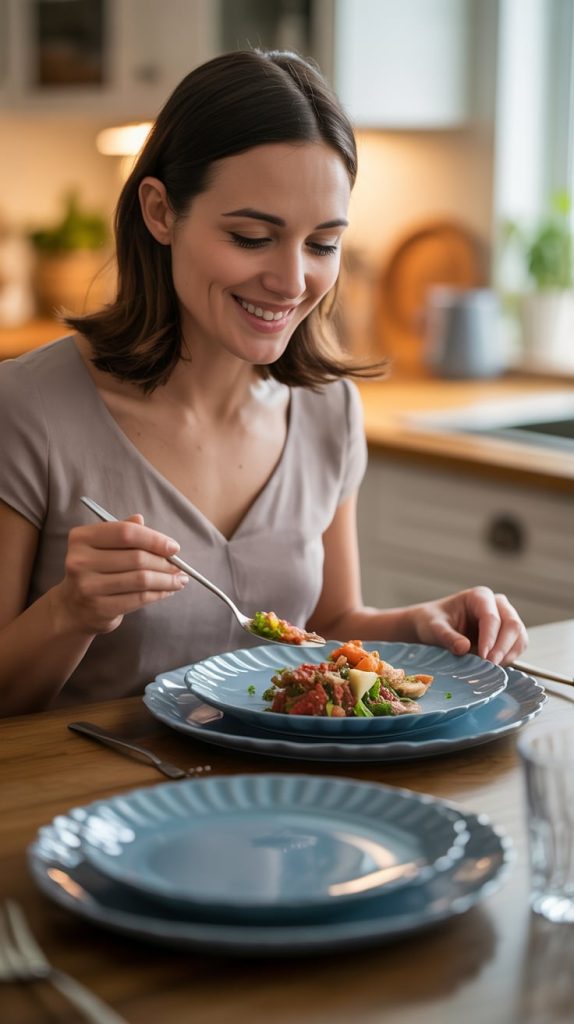10 Clever Ways To Stop Overeating And Get Healthy

Hey there! Glad you’re here for another chat about eating habits.
I’ve talked a lot about building better food habits, but it still surprises me how much there is to unpack.
This time, I’m diving into something that gave me a hard time for years before I finally got a handle on it.
What I’m sharing comes straight from my own ups and downs.
The Struggles of Overeating
Overeating can wear you out. It brings on guilt and steals the fun out of eating.
We come up with all kinds of rules in our heads—determined to stop at the right bite.
But somehow, that second (or third) helping still ends up on the plate. 😬
If that sounds familiar, you’re not alone. I’ve been there, too.
Trying to figure out how much is “enough” can drive you nuts.
But I’m here now, ready to share what’s worked for me.
Let’s walk through some real ways to stop overeating—and I promise, these are tips you’ll actually like. 🧙
Just one thing before we start:
Leave the guilt behind. This is a space for self-trust and kindness, not blame.
Take a deep breath. You’re ready for change.
It’s you and me versus some tough habits—and we’ve got this.
10 Simple Ways To Stop Overeating
1. Don’t Skip Meals
I used to think skipping breakfast or lunch would “save” calories.
But by the evening, I’d be starving.
And that’s when the overeating would hit.
Hunger would take over logic.
I’d eat way too fast and way too much.
Now I eat regular meals, even if they’re small.
It keeps my hunger in check, which helps my brain stay in control instead of my cravings.
Eat before you’re starving.
That one thing changed so much for me.
2. Pause Before Getting Seconds
This one took practice.
I’d eat my plate clean, then go right back for more out of habit—not hunger.
Now I stop for a few minutes first.
I take a breath.
I drink some water.
I ask myself, “Am I still hungry, or do I just want to eat more?”
Sometimes I wait ten minutes.
Most of the time, the urge passes.
Give your body time to catch up.
It takes a while for it to say, “Hey, I’m full.”
3. Keep Snacks Out of Sight
If chips were in the cupboard, I’d eat them.
If cookies were on the counter, I’d grab one without thinking.
Then I’d grab another.
Out of sight, out of mind actually works.
Now I keep snacks in a closed cabinet—or better yet, don’t buy ones I know I’ll overeat.
I’m not saying never have treats.
Just don’t leave them where you’ll see them all day.
If I have to work harder to get to the food, I’m less likely to overeat it.
4. Use Smaller Plates and Bowls
I used to laugh at this tip.
Like, how could a smaller plate help?
But it really did.
A big plate made me feel like I had to fill it.
So I did.
Then I ate all of it, even if I wasn’t that hungry.
Now I use smaller plates.
They still look full, and I still feel satisfied.
I can always go back for more if I truly need it.
But I don’t start with a mountain of food anymore.
5. Eat Without Distractions
I can’t tell you how many times I’ve eaten a whole meal while watching TV and barely noticed.
Next thing I know, the food is gone, and I’m still reaching for something else.
Now I try to sit down at the table without my phone or the TV on.
Just me and my food.
I eat slower.
I notice the flavors.
And I stop when I’m full—because I actually feel it.
It’s not always easy, but even doing it for one meal a day helps.
6. Check in With Your Emotions
This one was big for me.
I used to eat when I was bored.
Or sad.
Or stressed.
Or just kind of “blah.”
Food felt like comfort.
But it didn’t solve the feeling.
And afterward, I’d feel worse.
Now, before I grab food, I ask myself:
“Am I hungry, or am I feeling something else?”
Sometimes I still eat.
But I try to notice why.
And the more I practice that, the more control I feel.
7. Don’t Label Foods as “Good” or “Bad”
I used to think, “If I eat a cookie, I’ve failed.”
That thinking only made me want the cookie more.
And once I had one, I’d say, “Screw it,” and eat five more.
Now I don’t label food that way.
Food is food.
Some fuels my body more, some fuels my cravings more.
But none of it makes me a “bad” person.
Letting go of that guilt made a huge difference.
Now, when I do eat treats, I enjoy them—without the shame.
And that stops the binge spiral.
8. Drink More Water
I know, I know.
You’ve heard this one before.
But I didn’t realize how often I was just thirsty—not hungry.
Now I drink a glass of water before meals.
And if I’m feeling snacky, I try sipping water first.
Sometimes I still eat.
But sometimes the urge goes away.
It’s simple, free, and actually works.
9. Plan Your Meals
When I wing it, I overeat.
I grab random things.
I snack while cooking.
I end up eating more than I need without realizing it.
Now I plan my meals ahead—even if it’s just the night before.
Knowing what I’ll eat makes me less likely to grab junk out of convenience.
It’s not about dieting.
It’s just about having a plan.
And for me, a plan means less panic eating.
10. Forgive Yourself and Keep Going
This might be the most important one.
You’re going to mess up sometimes.
So will I.
We’re human.
The key is not letting one bad day turn into ten.
If I overeat, I don’t punish myself anymore.
I don’t skip the next meal or beat myself up.
I take a breath.
I remind myself I’m still learning.
And I keep going.
One bad moment doesn’t erase all the progress.
Final Thoughts
There are so many ways to stop overeating, and no single trick works for everyone.
But trying a few of these helped me build a better relationship with food.
They’re small changes, but they added up.
If you’ve been feeling stuck, I hope something in this list gives you a place to start.
Be patient with yourself.
You’re not broken—you’re just learning.
And you’re not doing it alone.









